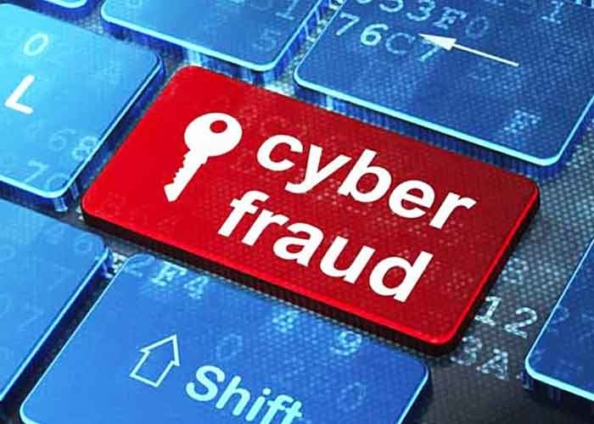Fraud Security and Investigations Specialist, Ransford Nana Addo has shared some signals individuals may look out for to enable them detect scamming or fraudulent activities as some people may genuinely be ignorant and could easily fall prey to activities of scammers.
According to him, some telling calls from theses scammers look too good to be true and these fraudsters deploy smart mechanisms to make the customer believe they are genuinely speaking with a bank staff.
“When it seems too good to be true, no bank in this country will tell you that we are going to update your Ghana card or bank record for you remotely, that is not happening,” he said.
He indicated that some of the fraudsters have registered their numbers in the ‘true caller’ app with the bank’s name and therefore when the customer receives the call, the name appears on their phone as though it is from their bank.
“The other trick is that they have registered this fraudulent sim card’s true caller, so when they call, it comes with the name of the bank and make people fall prey.”
“So you see the number coming as bank A or whatever, still do not fall prey, it is a true caller trick.”
“The next trick is that sometimes they put you on hold and they play the jingle of your bank for you to hear so you also think that this is genuine, don’t fall prey to it,” he advised.
Mr. Addo who is also the President of the Fraud Forum, Ghana Association of Banks cautioned that, no bank will call a customer demanding for their password or PIN number especially if there is an unusual sense of urgency, deadlines and threats.
“The next thing is that no bank will ever ask you to share your pin, password or OTP, these guys come under urgency, that we’re closing your bank account, the deadline for us to do the upgrade is due, when there’s a sense of urgency, sense danger, that this could be somebody pushing me.”
“Because some of the audios that we have listened to, the customers actually tell them that I’m not too far from the banking hall, I’ll come there and they will say no don’t come, no bank staff will call you with the sense of urgency and also threaten you and will not even allow you the option of walking in to the banking hall.”
“They will put pressure on you that if you don’t come, the Bank of Ghana has directed that we update your account or we close it, so when they are threatening you, then watch out,” the Fraud Specialist cautioned.
He added that, some of these fraudsters are very smart and intelligent that they can research the first six digits of a visa card number and mention them when they call, which may deceive the customer to believe that they are genuinely speaking with a bank staff and be tempted to give out the rest of the digits.
According to him, the first six digits of every visa or Master card number are universally known and it is referred to as the Bank Identification Number, therefore if someone calls and starts mentioning those digits, it does not mean they know the rest of the digits.
He advised customers to be very vigilant and not share this information.
“They call and they begin to say that we’re calling from your bank, mention your visa card number, the one that starts with 4-8…, and everybody says oh they have stared mentioning it so it means that they are from the bank, No.”
“The first six digits of a card number is universal, everybody knows it, it’s called Bank Identification Number, you can go online and check, every visa number starts with 4, every Master card starts with 5.”
“So immediately somebody calls and begins to mention the first digits and you think that because of that he knows my master card already, so let me give it out, you have fallen prey," he advised.
Mr. Addo again, disclosed that visa or Master cards can be used online without the customer’s PIN number therefore people should be on the lookout.
“And so if anybody tells you that we have initiated a transaction and we need you to give us the code, they are actually taking the key that the bank has given to you to defraud you,” he stated.
Ransford Nana Addo Jnr. is a Fraud Security and Investigations Specialist, President of the Fraud Forum, Ghana Association of Banks and a lecturer at the National Banking College.
Latest Stories
-
Dr. Musah Abdulai: If the Chief Justice returns: Will it lead to reset, redemption, or rupture?
3 hours -
Tano Deity dispute: Bantamahene pardoned after offering guilty plea to Asantehene
4 hours -
Dumelo inaugurates Board of Tree Crop Development Authority
4 hours -
Akufo-Addo’s office denies reports of attempting to influence upcoming NPP Delegates Conference
4 hours -
WAFCON 2024: Second half brilliance against Tanzania takes Black Queens to quarter-finals
4 hours -
Dison International School holds colourful graduation to mark academic progress
4 hours -
UMaT launches IET-GH Student Chapter with a call to engineer a better future
4 hours -
Dialysis crisis: Cape Coast Teaching Hospital struggling to keep up with demand
4 hours -
NPP must not sideline Kufuor in key decisions – Dr Asah-Asante warns
5 hours -
Afenyo-Markin under fire for ‘strange elevation’ comment to Essikado MP ‘over’ Zanetor
5 hours -
Abanga Yakubu refutes allegations of leading unauthorised anti-galamsey operations
5 hours -
Minority, Majority MPs clash over credit for Ghana’s economic gains
6 hours -
2025 NPP Congress: Kufuor, Akufo-Addo to deliver virtual address to delegates
6 hours -
UG lifts ban on social gatherings amid improved COVID-19 situation
6 hours -
Cataract, glaucoma, and pterygium predominant in Ketu North Municipality
7 hours

